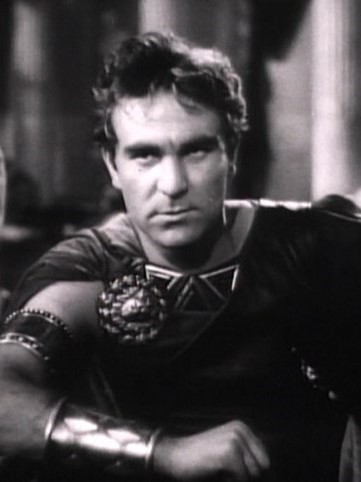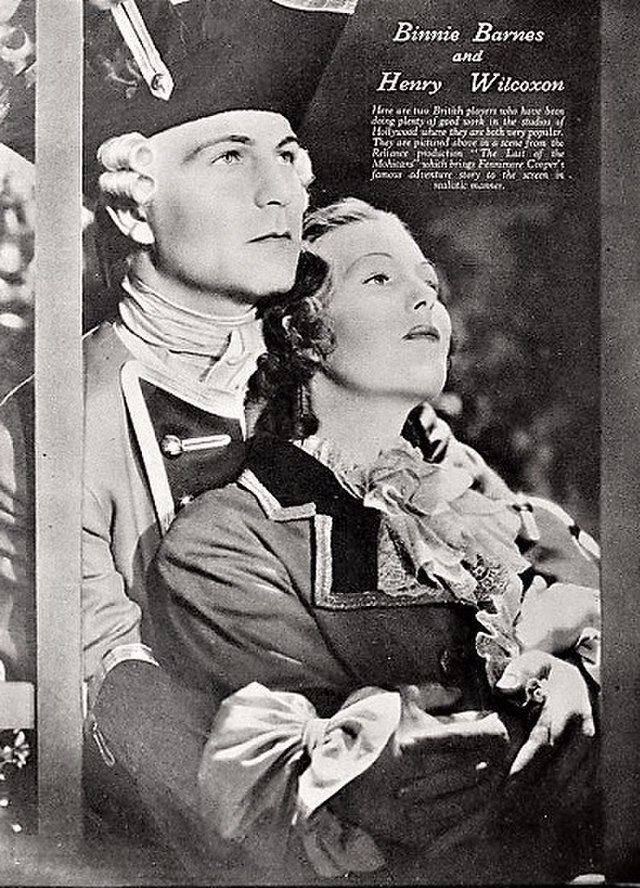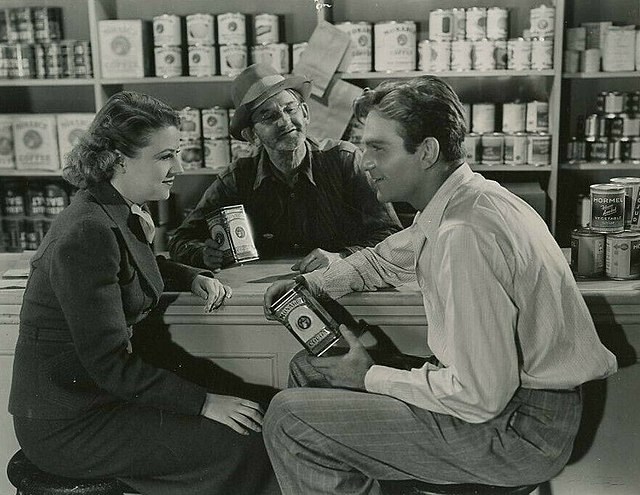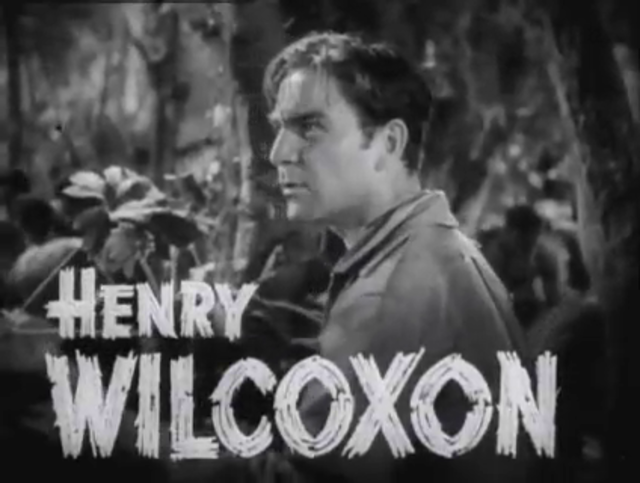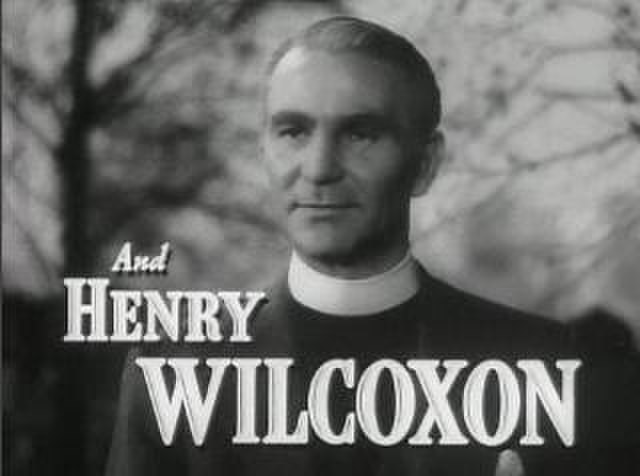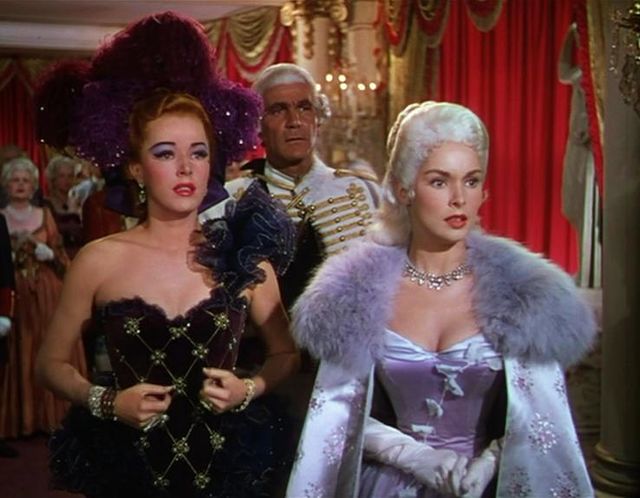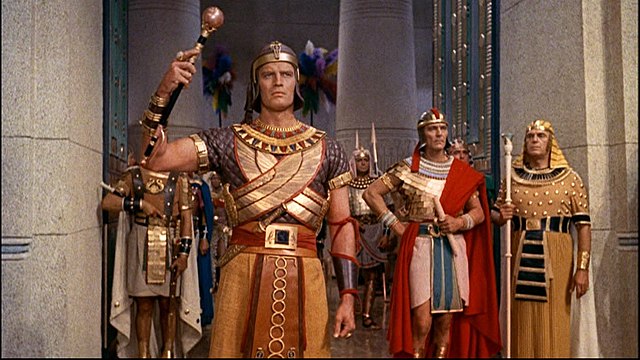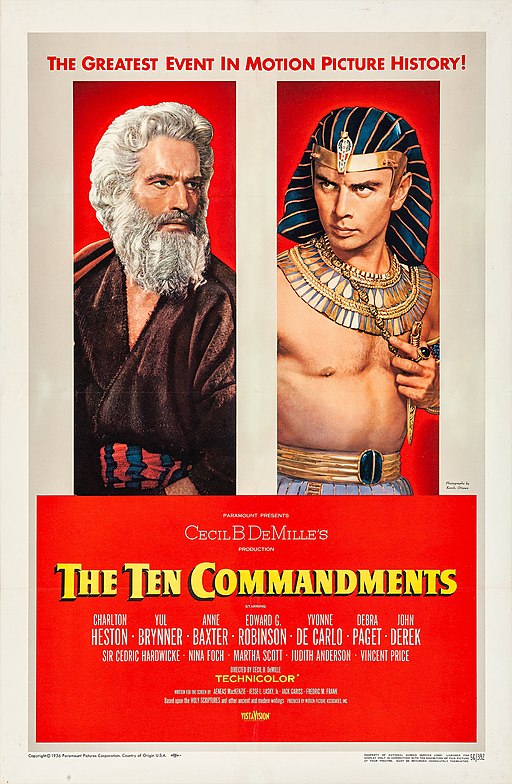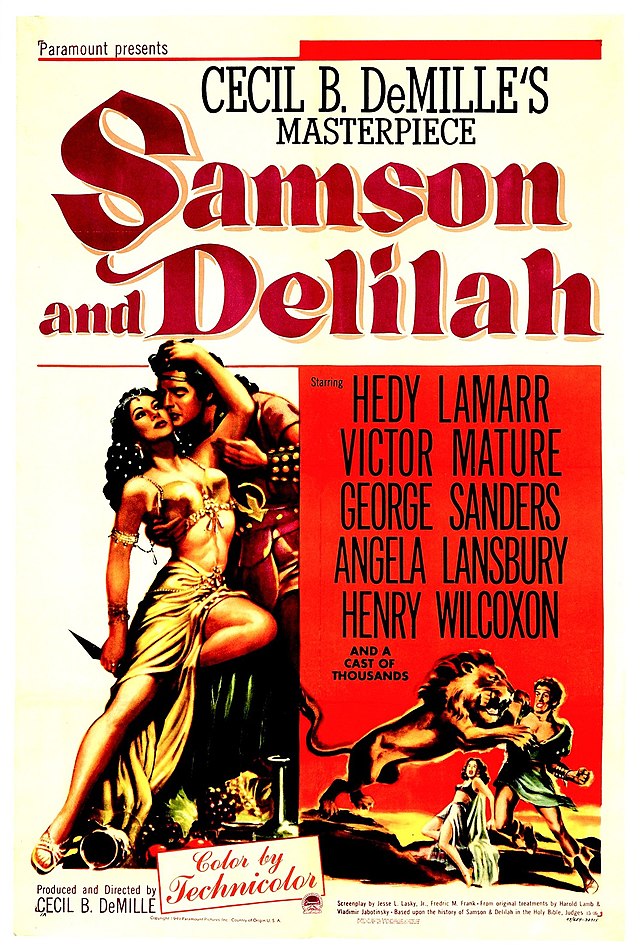Henry Wilcoxon
back| Full Name | Harry Frederick Wilcoxon |
| Stage Name | Henry Wilcoxon |
| Born | September 8, 1905 |
| Birthplace | Roseau, Dominica, British West Indies |
| Died | March 6, 1984 |
| Buried | Forest Lawn Memorial Park, Hollywood Hills, Los Angeles, California, USA |
| Married to | Sheila Garrett (1940-1969, divorced) - Joan Woodbury (1971-his death in 1984) |
| Children | 3 daughters – Wendy, Heather, and Cecilia (two from his first marriage and one adopted daughter) |
| Notable films | Cleopatra (1934) - The CRusades (1935) - Tha Last of the Mohicans (1936) - Samson and Delilah (1949) - The Ten Commandments (1956) - The Buccaneer (1958) |
Henry Wilcoxon
DeMille’s Noble Hero
Henry Wilcoxon eventually found his way into acting, debuting in London’s West End and eventually becoming a prominent face in Hollywood, especially under the direction of Cecil B. DeMille, with whom he developed a strong professional relationship.
Wilcoxon starred in numerous significant roles in historical epics and dramas, often playing heroic or morally upright characters. His collaboration with DeMille in movies like Cleopatra and The Ten Commandments solidified his reputation as a skilled and versatile actor. Later in life, Wilcoxon shifted to producing and working behind the scenes, still closely tied to DeMille’s legacy.
Related
Henry Wilcoxon (1905 – 1984)
Biography and Career Overview
Henry Wilcoxon was born Harry Frederick Wilcoxon on September 8, 1905, in Roseau, Dominica, then part of the British West Indies. His father, Robert Stanley Wilcoxon, was an adventurer and writer, while his mother, Lurline Minnie Nunes, was a Jamaican of Portuguese descent. However, Henry’s early years were fraught with hardship: his mother died when he was only two, and his father became somewhat elusive. Wilcoxon was primarily raised in England by extended family, receiving an education at various schools, including a brief stint at a military academy. Despite the discipline of his schooling, Henry found himself drawn to the arts and eventually left school to pursue a career in acting.
Early Career and Rise to Fame
Wilcoxon’s first steps in acting came on London’s West End. His strong features, towering build, and striking presence on stage quickly gained him attention. After some experience in British theater and a few minor film roles, Wilcoxon sought to expand his career horizons by moving to Hollywood in the early 1930s. This move proved to be pivotal: he was soon cast in Cecil B. DeMille’s Cleopatra (1934), where he played Marc Antony opposite Claudette Colbert’s Cleopatra. This role cemented his status as a Hollywood leading man and marked the beginning of a fruitful partnership with DeMille.
Wilcoxon went on to appear in numerous iconic films, many of which were historical dramas or epic adventures directed by DeMille. He starred as King Richard the Lionheart in The Crusades (1935), Major Duncan Heyward in The Last of the Mohicans (1936), and as a warrior prince in Samson and Delilah (1949). Perhaps his most remembered role, however, was in The Ten Commandments (1956), where he portrayed Pentaur, a relatively minor yet significant character in the grand epic. Wilcoxon was known for his commanding screen presence and often played heroic or morally upstanding roles, reflecting the dignity and fortitude he was said to have in real life.
Marriages and Family Life
Wilcoxon’s first marriage was to Sheila Garrett in 1940, with whom he had two daughters, Wendy and Heather. Their marriage endured the pressures of Hollywood for nearly three decades but ended in divorce in 1969. Following his divorce, Wilcoxon later married actress Joan Woodbury in 1971. This union brought Wilcoxon a third daughter, Cecilia, whom he and Woodbury adopted.
Despite the demands of his acting career, Wilcoxon was known to be a loving and devoted father, often seen spending time with his family. His daughters recall him as a principled and gentle man who was equally dedicated to his personal life as to his craft. Wilcoxon’s second marriage to Woodbury was described as peaceful and enduring; they remained together until his death in 1984.
Personal Passions and Hobbies
Outside of acting, Henry Wilcoxon was an avid sailor and could frequently be found sailing along the Californian coast when not on set. This passion for the sea also had a relaxing effect on him, as he was known to prefer the solitude and peace that sailing offered. Wilcoxon also had a lifelong love of literature and was fond of reading history, particularly about the historical characters he often portrayed on screen. This affinity for history helped him portray many of his roles with a depth and authenticity that resonated with audiences.
Later Career and Work Behind the Scenes
As Wilcoxon’s on-screen career evolved, he shifted toward working behind the scenes, collaborating closely with DeMille on production tasks. He served as an associate producer on The Ten Commandments, which allowed him to channel his knowledge of cinema into aspects beyond acting. This move towards production highlighted Wilcoxon’s versatility within the industry and enabled him to contribute to the cinematic art form in a more comprehensive way.
Death and Legacy
Henry Wilcoxon passed away on March 6, 1984, in Los Angeles, California, after a brief battle with cancer. His death marked the end of an era, particularly for those who had witnessed his collaborations with DeMille and his contributions to classic Hollywood cinema. Wilcoxon was interred at Forest Lawn Memorial Park in Hollywood Hills, a resting place he shares with many other Hollywood greats.
Henry Wilcoxon’s career spanned nearly five decades and left an indelible mark on the Golden Age of Hollywood. His legacy as a leading man in historical epics, along with his unwavering dedication to his craft and quiet dignity, has continued to resonate with classic film enthusiasts.
Video Tribute on Henry Wilcoxon
Commanding Acting Style of Henry Wilcoxon
Henry Wilcoxon’s acting style was characterized by a strong, dignified presence that exuded an aura of authority and nobility. His performances often embodied a classic, almost theatrical gravitas that made him especially suited for historical and epic films, where he played powerful figures such as Marc Antony, King Richard the Lionheart, and other notable historical personalities.
Commanding Physical Presence
Wilcoxon was tall, with a solid, athletic build and ruggedly handsome features. This physicality contributed immensely to his style, helping him project strength, masculinity, and confidence on screen. He used his stance, movements, and posture to convey the power of the characters he portrayed, often standing tall with squared shoulders and a firm gaze that suggested a depth of conviction or resolve. His physical expressiveness was deliberate yet natural, lending him a larger-than-life presence in roles that demanded a mix of physicality and authority.
Refined and Noble Demeanor
Wilcoxon had a uniquely aristocratic air, perhaps influenced by his British upbringing and classical theater experience, which he channeled into many of his roles. His articulation was precise, and he delivered lines with a formality that gave his characters a regal edge, perfect for portraying kings, generals, and other figures of authority. He was able to elevate dialogue, imbuing even simple lines with weight and meaning. This was particularly effective in films with director Cecil B. DeMille, where Wilcoxon’s refined acting lent credibility to the epic storytelling.
Reserved Intensity and Stoicism
Wilcoxon’s acting style was often more subdued than some of his contemporaries. Rather than over-expressing, he employed a quiet intensity and often underplayed his emotions, bringing an aura of stoicism to his characters. This restraint made his performances appear thoughtful and mature, and audiences could sense the internal strength of his characters even when he wasn’t speaking. When his characters did experience moments of heightened emotion, his subtle approach made these outbursts more impactful.
Heroic Idealism
Many of Wilcoxon’s roles had him embodying virtues like courage, loyalty, and honor, qualities he depicted with a straightforward honesty that connected with audiences. He often played characters who had a clear sense of duty and were willing to make sacrifices for their beliefs or loved ones, giving his performances a sense of moral integrity. This aspect of his style made him well-suited to play heroic figures who represented the virtues of their respective historical eras.
Commitment to Historical Authenticity
Wilcoxon’s love for history shone through in his approach to historical characters. He was known to immerse himself in the background and motivations of the figures he portrayed, aiming for authenticity in both appearance and demeanor. Whether donning elaborate costumes or delivering archaic dialogue, he fully committed to the role, creating a sense of time and place that audiences could believe in. His collaboration with DeMille, who was known for elaborate sets and period-accurate details, showcased Wilcoxon’s ability to adapt his performance to the historical and dramatic scope of each story.
Collaboration with Directors
Wilcoxon’s performances reflect a deep respect for the director’s vision, especially evident in his work with Cecil B. DeMille. This collaborative approach gave his acting style a sense of cohesion within the grand narratives of his films, as he adjusted his performance to complement DeMille’s sweeping directorial style. His willingness to take direction and adapt to the needs of the story enhanced his roles, whether he was in a leading part or supporting role.
Legacy of Classical Acting
Henry Wilcoxon’s style represents an era of classical Hollywood acting, where actors embodied a certain gravitas and poise that gave them a timeless quality. His roles in epic, historical films allowed him to become a quintessential figure in this genre, and his restrained, dignified approach has often been praised as a precursor to the more grounded historical performances we see today.
In essence, Wilcoxon’s acting style was a blend of physical strength, emotional restraint, and an almost regal authority that made him a memorable figure in cinematic history. His performances still resonate as portrayals of iconic and heroic characters, capturing a noble idealism that marked Hollywood’s golden age.
Personal Quotes from Henry Wilcoxon
· On working with Cecil B. DeMille:
"DeMille didn’t just make movies; he created spectacles. Working with him was like stepping into history, and you had to live up to that grandeur."
· Reflecting on his acting philosophy:
"An actor should bring dignity to his role. Whether it’s a king or a commoner, each part deserves respect and depth."
· On his breakout role as Marc Antony in Cleopatra (1934):
"Playing Marc Antony was like being thrust into the deep end of history. The role demanded not only strength but also vulnerability, and I had to learn how to balance both."
· On why he loved historical roles:
"History is full of passion and ideals. When you step into the shoes of a historical figure, you’re bringing the past to life for the audience, and that’s a privilege."
· About his relationship with Hollywood fame:
"I never aimed for stardom. I aimed for the chance to tell stories that matter, to play characters that had something to say about courage, integrity, and the human spirit."
· On his favorite roles:
"I’ve always been drawn to characters who have a sense of purpose, who fight for something bigger than themselves. Those are the roles that stay with you."
· On the impact of his classic films:
"I think audiences remember these films because they offer more than entertainment. They offer ideals, something timeless. If I contributed even a little to that, then I’ve done my job."
· On staying grounded:
"In this business, you can lose yourself easily. But if you remember why you started – to be a part of something greater – that keeps you on the right path."
Awards and Recognition
Henry Wilcoxon, while not heavily decorated with formal awards, received significant recognition and respect throughout his career, particularly for his contributions to classic Hollywood cinema. Much of his acclaim came from his collaborations with Cecil B. DeMille and his memorable portrayals in historical epics, which earned him a unique place in Hollywood history.
Key Recognitions and Honors
- Honorary Awards and Festival Recognition
Though Wilcoxon was not awarded mainstream industry awards such as Oscars or Golden Globes, he did receive honorary recognition at several classic film festivals, particularly in the later years of his career. These honors were typically awarded in appreciation of his contributions to the Golden Age of Hollywood and his roles in enduring epics like Cleopatra and The Ten Commandments.
- Recognition in Hollywood’s DeMille Legacy
Wilcoxon’s work with Cecil B. DeMille earned him informal but lasting industry respect as a cornerstone of DeMille’s historical films. His association with DeMille elevated his status, as he was often considered an essential part of DeMille’s filmic "stock company" (a group of actors regularly cast by the director). This unique partnership brought Wilcoxon enduring fame and recognition in the industry as a "DeMille actor."
- Legacy in Historical Cinema
Film historians and critics have regularly acknowledged Wilcoxon’s role in establishing the archetype of the noble, heroic figure in historical cinema. He’s been praised for his commanding screen presence and dignified performances, especially in roles that depicted legendary characters like Marc Antony, King Richard the Lionheart, and others. Though not awards in the traditional sense, these acknowledgments by film historians highlight his lasting impact on the genre.
- Cultural Influence and Recognition
Wilcoxon’s portrayal of iconic characters contributed significantly to the public’s perception of historical and biblical figures, especially in the 1930s-50s. His dignified, heroic performances made him an admired figure among audiences and industry insiders alike. In particular, his portrayal of Marc Antony in Cleopatra and Pentaur in The Ten Commandments became part of Hollywood’s enduring cultural legacy.
- Star on the Hollywood Walk of Fame
Wilcoxon received a star on the Hollywood Walk of Fame in recognition of his contributions to the motion picture industry, a testament to his legacy and impact. The star is located at 6328 Hollywood Boulevard, a fitting tribute for his dedication to film.
- Posthumous Tributes and Retrospectives
Following his death in 1984, Wilcoxon’s contributions to cinema were highlighted in retrospectives on classic film channels and at film festivals dedicated to Hollywood’s Golden Age. These tributes celebrated his acting and his long-standing partnership with Cecil B. DeMille, with several retrospectives screening films like Cleopatra, The Ten Commandments, and Samson and Delilah to honor his work.
Movies with Henry Wilcoxon
1930s
- 1932 – The Perfect Lady
Wilcoxon’s early role in this British comedy-drama saw him cast in a light romantic plot. - 1933 – This is the Life
Wilcoxon starred in this British musical comedy that focused on light-hearted love and family relationships. - 1934 – Cleopatra
Playing Marc Antony alongside Claudette Colbert’s Cleopatra, Wilcoxon’s breakout role in this Cecil B. DeMille epic portrayed him as the passionate Roman general in a dramatic retelling of Cleopatra’s romance and political maneuvering. - 1935 – The Crusades
In this historical epic directed by DeMille, Wilcoxon starred as King Richard the Lionheart. The film followed the Third Crusade and combined historical action with religious themes, as Richard embarks on a mission to reclaim Jerusalem. - 1936 – The Last of the Mohicans
Wilcoxon played Major Duncan Heyward in this adaptation of James Fenimore Cooper’s novel, which explored Native American and colonial struggles during the French and Indian War. - 1937 – If I Were King
A historical adventure film set in 15th-century France, Wilcoxon took a minor role, with the story focusing on poet François Villon as he thwarts an invading force. - 1938 – Suez
Wilcoxon had a supporting role in this fictionalized retelling of the construction of the Suez Canal, starring Tyrone Power. - 1939 – Rulers of the Sea
In this adventure film, Wilcoxon played David Gillespie, a Scotsman who teams up with a shipbuilder to develop a steamship, emphasizing industrial innovation.
1940s
- 1942 – Reap the Wild Wind
Wilcoxon starred alongside John Wayne in this maritime adventure film set in the 1840s. As Captain Jack Stuart, he finds himself in a love triangle amid rival salvage operations. - 1947 – Unconquered
Another DeMille-directed historical epic, this film starred Wilcoxon as Captain Steele, involved in defending the American colonies from Native American attacks, featuring strong frontier themes. - 1949 – Samson and Delilah
Wilcoxon portrayed Prince Ahtur, a Philistine who opposes Samson, in this Biblical epic based on the story of the Israelite warrior who falls for Delilah. The movie became one of the highest-grossing films of the year.
1950s
- 1952 – The Savage
Wilcoxon took a supporting role in this western about a white man raised by Native Americans who gets caught between two worlds. - 1956 – The Ten Commandments
In this epic Biblical retelling, Wilcoxon had a smaller role as Pentaur, a court member during Moses’ exile and return to Egypt. This film became one of DeMille’s most celebrated productions. - 1958 – The Buccaneer
Set during the War of 1812, this pirate adventure saw Wilcoxon in a supporting role, exploring the adventures of pirate Jean Lafitte who aids Andrew Jackson in the Battle of New Orleans.
1960s
- 1963 – Cleopatra (uncredited role)
Wilcoxon made a cameo appearance in this epic film starring Elizabeth Taylor. He returned briefly to the screen in a tribute to his earlier role as Marc Antony. - 1966 – The Plainsman
A western adventure film where Wilcoxon took a minor role, the story focused on Wild Bill Hickok and his involvement in the Old West.
1970s
- 1975 – The Wild McCullochs
Wilcoxon played a sheriff in this drama about a rebellious young man dealing with family struggles and conflicts with the law in the American South. - 1978 – Sweet Hostage
In a smaller role, Wilcoxon appeared in this TV movie about a troubled man who kidnaps a young woman, leading to an unexpected bond.
1980s
- 1981 – Caveman
One of Wilcoxon’s last appearances, he played an elder in this prehistoric comedy featuring a caveman’s misadventures.

